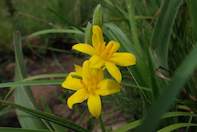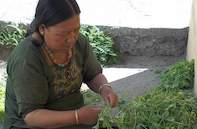What is Ethnobotany?
Most people who I tell I am an ethnobotanist look at me funny and say what is that!?
Yet ethnobotany-the study of the relationship between people and plants affects our lives minute to minute. From the food we eat, to the beverages we drink, incenses and essential oils we use to relax - all come from plants.
So plants are working behind the scenes in our lives, day to day we rely on them for health and wellness, but many of us have forgotten their important role because most of us moderns do not gather our own plants for food, build our homes or furniture ourselves from trees anymore, or take plants for religious purposes like our ancestors did. So in this way we have become disconnected from nature and plants in our lives. This is where ethnobotanists do important work.
We ethnobotanists often visit and live with traditional indigenous societies and record how people use plants for medicines, foods, crafts, cosmetics etc., for application of that knowledge into our modern day lives into our diets, growing plants and into products etc.
How Can Ethnobotany and Knowing the Use of Medicinal Plants Benefit You?

Knowing how medicinal plants work as healing remedies in the body is immensely valuable so that we can use plant medicines to reduce stress and anxiety, improve concentration, energy and well-being and even enhance intuition and dreaming. Many applications exist from using medicinal plants; from treating addictions and depression (San Pedro and Ayahuasca for example), increasing energy, memory and endurance (Bacopa monnieri and Ginseng etc) and for pleasurable upliftment: coffee, chocolate, incenses etc.
South Africa has many unexplored medicinal and psychoactive plants and as an ethnobotanist it has been extremely rewarding learning from authentic traditional healers about their uses in helping to heal mental and physically based conditions such as stress, heart disease, inflammation, arthritis etc. This knowledge should be shared with product developers with consent and Access Benefit Sharing in place with the indigenous knowledge holders involved. Some of the success stories of Southern African medicinal plants having made international popularity as products include: buchu, bitter aloe, rooibos, bulbine, devil's claw, hoodia, and “African potato” to name a few. So ethnobotany is really all about the value of plants in our lives as foods and medicines that sustain us and keep us healthy. A big word for really a fundamental study! Without plants we would not be!
I have incepted a project called the Khanyisa Healing Garden in order to study and use our African indigenous healing medicinal plants for previously disadvantaged community upliftment. I am looking for active collaboration from private South African nature reserves or land owners who see the value of this project into the future. For more on my Khanyisa Healing Garden Project please see here: https://www.khanyisagarden.co.za

